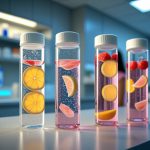Our bodies are remarkable machines, constantly working to maintain equilibrium – homeostasis. A crucial component of this balance is hydration. We’re often told to drink eight glasses of water a day, and while that’s a good starting point, it doesn’t tell the whole story. True hydration isn’t simply about volume; it’s about how effectively our bodies absorb and utilize fluids. Many modern beverages offer volume without substantial cellular nourishment, leaving us feeling hydrated on the surface but potentially lacking deeper internal replenishment. This is where the ancient wisdom of herbalism offers a compelling alternative – specifically, through the use of mucilaginous herbal waters.
Beyond basic water intake, we can enhance hydration with substances that not only provide fluid but also offer additional benefits like electrolyte restoration and cellular support. Mucilaginous herbs, containing a gel-like substance called mucilage, are uniquely suited for this purpose. This mucilage coats and soothes the digestive tract, improving nutrient absorption and preventing rapid fluid loss. It’s a holistic approach to hydration that goes beyond quenching thirst; it seeks to nourish and restore vitality from within. The use of these herbal waters taps into centuries-old traditions, offering a gentle yet powerful method for supporting overall wellbeing.
Understanding Mucilage & Herbal Waters
Mucilage is a complex carbohydrate found in many plants, particularly those known for their soothing properties. It’s what gives flaxseeds their slippery texture when soaked, or aloe vera its gel-like consistency. This substance isn’t easily digested, so it passes through the digestive system relatively intact, providing a protective layer to the intestinal lining. This is incredibly beneficial because a healthy gut is fundamental for optimal hydration and nutrient uptake. A compromised gut barrier can lead to leaky gut syndrome, hindering absorption and exacerbating dehydration. Understanding this connection allows us to see how these herbal waters support overall digestive health, making them more than just a hydrating beverage.
Herbal waters, in this context, aren’t simply infusions; they are often longer, cooler macerations or decoctions designed to extract the maximum amount of mucilage from herbs. This differs from quickly brewed teas which focus more on volatile oils and flavor compounds. The process typically involves soaking the herb in water (cold or slightly warm) for several hours, even overnight, allowing the mucilage to fully release. This results in a liquid that is often somewhat viscous and has a subtly sweet, cooling taste.
These waters are readily absorbed by the body, delivering hydration alongside the benefits of the specific herbs used. Unlike some electrolyte-rich beverages which can be overly stimulating or contain added sugars, mucilaginous herbal waters offer a gentle, nourishing way to replenish fluids without disrupting the delicate balance of the system. They’re particularly useful during periods of intense heat, physical exertion, illness (especially diarrhea or vomiting), or simply when feeling depleted and in need of restorative hydration. For those seeking a more holistic approach, consider exploring plant waters with stabilizing electrolyte profiles for enhanced replenishment.
Herbs Rich in Mucilage
Several herbs stand out for their high mucilage content and suitability for making hydrating waters. Here are a few notable examples:
- Marshmallow root (Althaea officinalis) is perhaps the most well-known mucilaginous herb, renowned for its soothing effects on the digestive system and respiratory tract. Its water has a delicate sweetness and is incredibly gentle.
- Slippery elm bark (Ulmus rubra) offers similar benefits to marshmallow root, providing a protective coating to irritated tissues. It’s often used to soothe sore throats and digestive discomfort.
- Chia seeds while technically seeds and not herbs, are extraordinarily rich in mucilage. Soaking them in water creates a gel-like substance that provides hydration and fiber.
- Hibiscus flowers (specifically the calyces) contain mucilage alongside other beneficial compounds like antioxidants and vitamins. Hibiscus water has a tart, refreshing flavor and offers vibrant color.
Preparing these herbal waters is straightforward. For marshmallow root or slippery elm bark:
1. Combine 1 tablespoon of dried herb with 2 cups of cold water.
2. Allow to macerate for at least 4 hours, preferably overnight.
3. Strain the liquid through a fine mesh sieve or cheesecloth.
For chia seeds:
1. Mix 1-2 tablespoons of chia seeds with 1 cup of water.
2. Let sit for at least 30 minutes, stirring occasionally, until a gel forms.
Hibiscus can be prepared as a slightly warmer infusion (not boiling) for about 15-20 minutes before straining.
Incorporating Herbal Waters into Daily Life
The beauty of mucilaginous herbal waters lies in their versatility. They’re not just for times of dehydration; they can be woven into your daily routine to support ongoing wellness. Consider replacing one or more glasses of plain water with an herbal water throughout the day. This is a simple, proactive step that can significantly enhance hydration and improve overall health. To further refine your dietary choices, explore hydration with natural additions that don’t irritate for optimal wellbeing.
Beyond drinking them straight, these waters can be incorporated into other beverages. Add marshmallow root water to smoothies for extra texture and soothing properties. Use hibiscus water as a base for homemade electrolyte drinks (combined with a pinch of sea salt and perhaps a squeeze of lemon). Slippery elm water can even be used in facial toners due to its gentle, hydrating qualities. It’s important to listen to your body’s needs; some people may find certain herbs more beneficial than others. If you are looking for ways to integrate hydration into other parts of your lifestyle, consider daily flow management with gentle exercises.
Considerations & Gentle Reminders
While generally safe and well-tolerated, there are a few things to keep in mind when using mucilaginous herbal waters. Firstly, always source high-quality herbs from reputable suppliers to ensure purity and potency. Secondly, while these waters can be incredibly soothing, they might slightly interfere with the absorption of certain medications if consumed simultaneously. If you’re taking any prescription drugs, it’s best to space out your herbal water intake by at least an hour before or after medication.
Finally, remember that hydration is a holistic process. Mucilaginous herbal waters are a fantastic addition to a healthy lifestyle, but they shouldn’t replace other essential practices like eating hydrating foods (fruits and vegetables), getting adequate sleep, and managing stress levels. Focus on creating a balanced approach to wellbeing, and let these ancient remedies be a supportive element in your journey. For those concerned about potential interactions with medications, reviewing how herbal supplements can affect urine tests is a good starting point. Incorporating these waters alongside mindful practices can be enhanced by exploring resetting your flow system with gentle daily wins for a truly comprehensive approach.





















